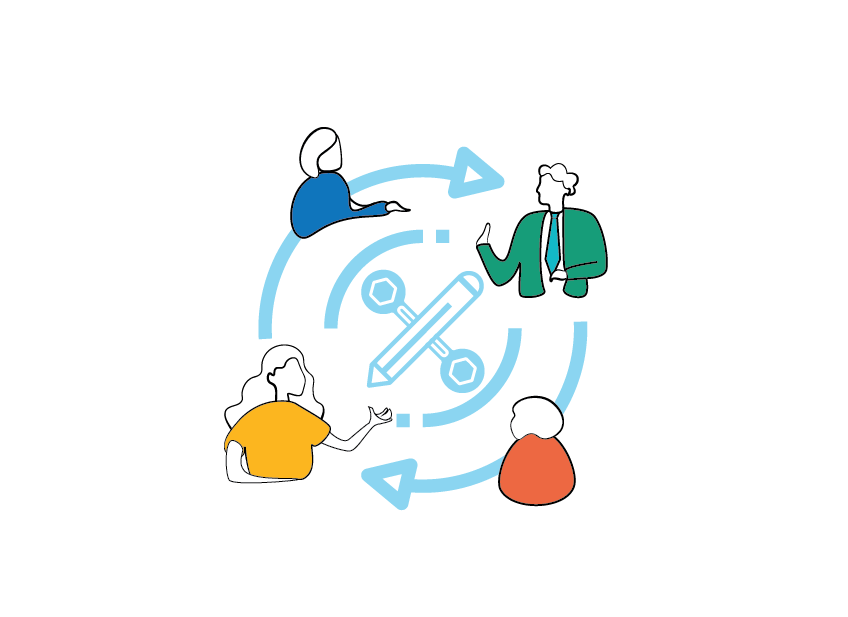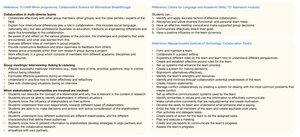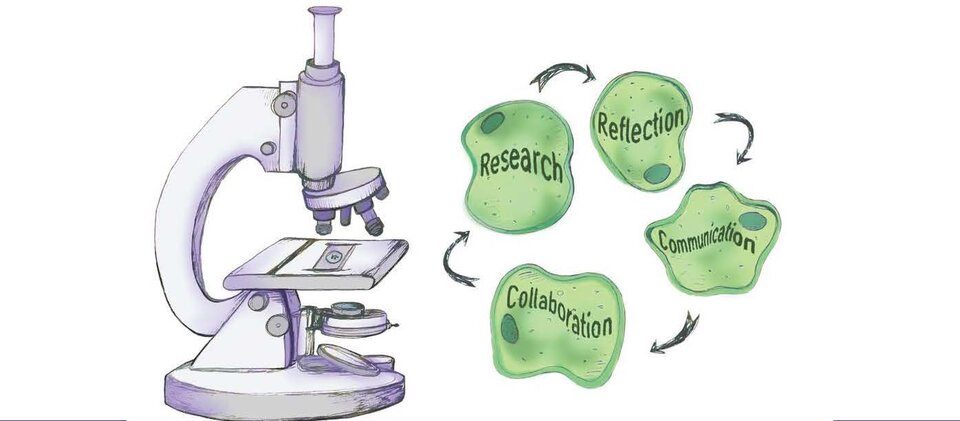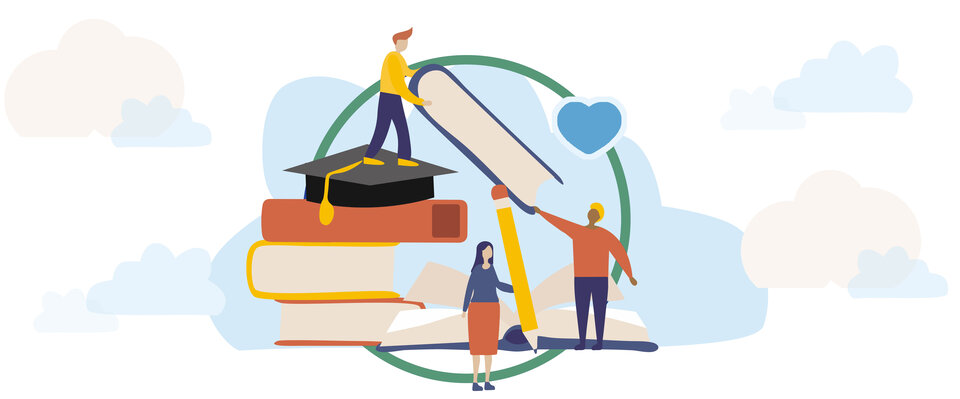Collaborative Learning
A teaching and learning strategy for students to learn together, from each other, through reflection. Collaborative Learning supports skills development for learning in diverse communities and addressing various learning needs.
There are multiple ways to stimulate Collaborative Learning within courses. Groupwork is one of the common ways to enable students to practice collaborative learning. Challenge-based, problem-based or community-based courses also offer students opportunities for collaborative learning, in an inter-disciplinary context. When aptly supported students also have the scope to practice collaborative learning in the classroom through group discussions, or peer-learning sessions.
-
- Development of relevant future (professional + sustainability) skills[8].
- Supports student motivation [1] and wellbeing[6,7].
- Increases self-efficacy [2] and self-esteem [3].
- Encourages an inclusive mindset and builds understanding of diversity [3].
- Improvement of students’ cognitive performance, meta-cognition [4], and critical thinking [5].
-
- Larger, complex and more interesting projects could be completed by students when working collaboratively.
- Your workload can be reduced by enabling students to resolve problems with and learn from each other.
- Allows you to be more inclusive of different learning styles and encourage participation.
- Groupwork can address practical limitations such as lab equipment, or grading capacity.
Some Learning Objectives that align with Collaborative Learning:
- Reasoning, reflecting, and forming a judgment.
- Co-operating and communicating with others.
-
- Shared emotional connections
- Positive & mutual Interdependence
- Promotive Interaction to maximize learning
- Interpersonal and group skills
- Individual accountability and personal responsibility
- Group processing
Based on [6] and [9]
Wellbeing, learning and human connection are intrinsically linked.
Mieke van der Bijl-Brouwer

Collaborative Learning Tools for Teachers & Students
This is an open-source compilation for TU Delft students and staff based on various offerings, learnings and sources from literature and TU Delft. The intention of the toolkit is to support students and teachers to engage in (and facilitate) Collaborative Learning, amongst peers.
Pilot Collaborative Learning within your courses
Contact Nina van den Heiligenberg (n.j.w.m.vandenheiligenberg@tudelft.nl) to pilot teamwork workshops, coaching and feedback by experts, or Annie Aggarwal (a.aggarwal@tudelft.nl) to develop and test collaborative learning materials and activities.
Educational advice for Collaborative Learning in curriculum
Soon on Teaching Support
There are multiple ways for program directors, coordinators and teachers to stimulate Collaborative Learning within curriculum. From creating space in programmes and formulating collaboration specific learning objectives, to simply prompting group discussions and peer interactions in the classrooms to teamwork or projects in courses. All offer abundant opportunities for collaborative learning within curriculum.
Though as you may have experienced group work is not without challenges, and students may prefer to work by themselves. To engage in meaningful collaboration students, require guidance and support. The following tips offer guidance and support for shaping teamwork in courses and facilitating collaborative learning in the classroom.
Working in a group does not simply lead to collaboration. It requires skills to work together and communicate with each other. Furthermore, the groupwork assignments and environment should be designed in a way suitable for collaboration.
As you may have experienced, students often encounter collaboration issues. Most common ones being:
- Free riding: some students reduce their effort or hardly contribute at all during team assignments. This makes it difficult for you to ensure that all students have met the learning outcomes of the course and contributed to the project results.
- The Sucker effect: This issue arises from free riding. Other students may feel that their efforts are leading to unfairness and that they are being taken advantage of by the free riders. Consequently, these students reduce their effort. They might think, “I won’t put too much effort into the assignment because the grade will probably be around 6 or 7 anyway.”
- Students may breakup the assignment into parts, assign each part to one another, and then briefly integrate prior to submission. The work then is not discussed or reviewed as a team and limited new knowledge is generated.
While behaviors such as ‘free riding’, may be easily noticed and summed up as being lazy, or not caring; the reasons may range from not being able to find space to contribute, being overwhelmed trying to keep up, or dire personal circumstances. It is important for students to address these issues mindfully and with appropriate support.
The following sections provide tips for shaping, facilitating and monitoring teamwork within courses.
Design and develop teamwork prior to course
-
- Formulate clear learning objectives for teamwork and evaluate collaboration. To ensure a collaborative practice for learning during the course, and when applicable assessment of collaboration skills.
“Mention and emphasize the learning outcomes and importance of teamwork in the course manual and beginning of the course.”
- Teamwork enables the development of various student skills, broadly covered under:
- Co-operating and communicating with others.
- Reasoning, reflecting, and forming a judgment.
- Or more explicitly, applying teamwork techniques that allow forming effective teams that communicate actively and constructively and engage in collaborative learning.
These can be covered in as broad or as in-depth as the course allows. In terms of the design of the course, and space for collaborative dialogue and reflection. Examples of learning objectives that require collaboration, or support the development of collaboration skills are provided below:
-
- In terms of group size, a minimum of 3 and maximum of 5 students is best suited for meaningful interactions, diversity, and reduces the likelihood of free riding. Consider sub-teams in extremely large groups, or having inter-group discussions/ sessions for very small teams or pairs.
- Divide the teams yourself and ensure the greatest possible diversity level, talent, background, gender, interest, etc. or define everyone's unique contribution after dividing the group (Belbin/core quadrant). Heterogeneous groups work most effectively. In addition, it is a prerequisite for innovative ideas. Have students fill out a form in advance on which they fill in their qualities, experiences and interests. It doesn't just affect the result. It also increases learning efficiency.
- Enable student groups to form effective teams through guidance and reflection on the collaborative process. Have students formulate team goals, express expectations, and make agreements in a collaboration agreement and prompt continuation of collaborative dialogue throughout the course.
Learn more about supporting team collaboration in the following sections.
-
The following tips aim to provide you with ideas on how to optimize groupwork assignments that support CL and help to prevent common teamwork issues.
- Provide an authentic and challenging assignment that requires students to work together (large, complex) and is appropriate for the number of students in the groups. By creating a challenging and relevant assignment, students see the importance of collaboration and interaction, reasoning and evaluative thinking are facilitated.
- The task should be challenging and too complex to complete individually. It also shouldn’t be immediately clear to students how to complete it to invite a discussion among students.
- The tasks within the assignment should be interdependent, requiring students to communicate with each other (e.g., build a product that consists of several components to be integrated).
- Consider setting up the assignment in such way that students in teams have to explain theories or concepts to each other. This way more content could be processed and applied to the project/ assignment. Moreover, students would be aware of the whole assignment, not only “their parts”.
- The assignment description should include clear expected outcomes to reduce the likelihood of misaligned agreements and students’ freeloading.
- The assignment may include a competitive element between the teams, as it could strengthen the collaboration within the teams.
- Consider group size for your assignment. Note that in smaller groups (2-3) students would have a greater individual responsibility, but less opportunities for diverse input and complex team working processes. In larger groups students are likely to feel less motivated; however, larger groups can work well if the task is large enough to tackle and good supervision is offered.
- In cases where you aim to contribute to the development of students’ collaborative skill in your course, make sure to include it as a learning objective and specifically assess it.
- Consider relating individual assignments and components to groupwork. This way, students will be motivated to actively engage in the groupwork assignments, as these will also support their individual tasks.
-
It is important to understand how students’ progress during the groupwork activities. Regularly evaluating teamwork processes, can help students keep track of their collaboration, and address emerging conflicts or issues. It will also help educators keep an eye out and intervene when required in case of dire situations!
As it is noticed that multi-diverse groups may face power inequality and cross-cultural concerns that can hinder groupwork. Conflict ridden groupwork can not only negatively impact learning and project outcomes; it can severely affect student wellbeing, motivation for participation and learning.
Furthermore, you will have to assess the work of teams (and in some courses, collaboration skills). To ensure appropriate monitoring of students’ progress when working in teams:
- Get students to monitor their teamwork processes themselves, by providing relevant process related criteria. Find more examples of collaborative process related rubrics, and criteria for self-evaluation and peer feedback in the student materials. Select and adapt appropriate criteria that is fitting for the course, and groupwork activities.
-
- Ask students to individually evaluate teamwork process from their own perspective. Consider incorporating individual reflections throughout the course and/ or at the end. Additionally, ask each student to explain their role and contributions to the team and the project. For example, if they were unable to convince their peers of their ideas, this would provide them with a chance to explain what they would have done differently and why.
- Encourage students to provide peer-feedback throughout the teamwork during group meetings, and afterward.
- You may use the Buddy Check tool on BrightSpace for self- and peer- feedback. Please make sure that feedback and reflection are discussed with the teams. Without discussion feedback scores are not accurate enough and does not provide learning moments for students.
- Do consider various pieces of different information. For instance, if there were external parties (e.g., a client) involved, they would also have information on how the team proceeded. Moreover, you may have recruited teaching assistants or mentors in your course, who could observe and support student teams during the project. They can share the information about the team processes with you.
"Those with more teaching experience should focus on the process, while those with less teaching experience on content.”
-
The above-mentioned evaluations should be discussed with student teams during appropriate formative feedback moments.
“Formative feedback at least two times, around mid-way and before the end assessment gives students the opportunity to reflect on and adapt their collaborative processes”
-
The different sources of teamwork evaluation can inform the summative assessment for teamwork specific learning objectives. Though remember, each student receives an overall grade for the course corrected for individual performance: contribution to the result and the group process (Oakley, 2004). According to Davies (2009), recognizing the individual contribution is crucial and has a positive factor on group work behavior. Furthermore, according to the TU Delft assessment guidelines (Refer to Programme specific assessment policy) course grades should reflect the performance of individual students, also in case of group assignments.
Following is a sample of teamwork assessment distribution:
• 60% product/ result project
• 20% group process reflection, incl. external parties: appointments, task division, communication, etc.
• 20% Individual performance: self-assessment and peer review tool for group dialogue on contribution to the result and group process.
Facilitate and monitor teamwork during the course
-
Differences in pre-existing knowledge and speed of comprehension can be vulnerable aspects within groups. Students also tend to stick to roles they are most comfortable with, in a group, never being exposed to activities addressing specific skills.
To ensure that differences don’t turn into conflicts, and students can make the most out of groupwork opportunities; student groups must begin on the right note, with the space to formulate team goals, express expectations, and make agreements.
- At the beginning of the course, make sure you address working in groups during the orientation. Specify the value of working in groups such as critical thinking through negotiating perspectives, mention personal development goals and learning objectives related to teamwork. Doing so will give students space and purpose to learn collaboratively.
- At the start of the assignment, make students familiar with what is expected (in terms of deliverables, assessment criteria, good and bad examples, etc.). This can help students make clearer agreements within their teams.
- Help your students identify the (technical) skills and knowledge needed to complete the assignment. Encourage students to discuss both the skills they have and would like to develop while distributing tasks and responsibilities. Prompt students to take on different responsibilities to achieve personal goals and learning objectives.
-
Encourage students to sign a team contract and develop a project plan. Remember that not all students have learnt about team contract, and even if they have, refer them to the student materials. To enable students to align values, expectations, and set-up team goals, meeting and working norms with their groups
-
Instructions and template are provided for signing a team contract and tips on project planning. Refer to teamwork orientation materials.
-
- To dive even further into teamwork processes and diversity perspectives for collaboration, ask students to refer to BrightSpace courses on teamwork.
Even better! Organize a workshop on inclusive collaboration for students and teachers, or teamwork orientation workshops within specific courses with ITAV. Refer to trainings and events.
-
- Encourage students to have a teamwork discussion session half-way through the course, where they can reflect on how the team has succeeded so far. During the formative assessment of the assignment, ask about team processes.
- The evaluation section of student materials provides examples criteria and rubrics to support student and team reflection throughout the course.
- Topics such as conflict management, decision making or team dynamics, can be addressed a few weeks into teamwork.
- Contact ITAV to facilitate workshops on these topics, or train teaching assistants to host student-led workshops.
- Encourage students to have a teamwork discussion session half-way through the course, where they can reflect on how the team has succeeded so far. During the formative assessment of the assignment, ask about team processes.
-
Different interactive components can be employed in the classroom to enhance motivation and participation by prompting peer engagement.
- Use peer instruction [10] wherein a traditional lecture is intermixed with conceptual questions. Students respond via voting or quiz, discuss with peers, and respond again.
- When possible, implement a studio setting where students’ groups can sit together at a table. To encourage all students to participate in discussions rather than a select few who a comfortable enough to speak up in plenary settings.
- Other learning activities such as in-class demonstrations of both challenges and good examples voluntarily by students can also prompt peer learning and addressing common challenges and queries.
- Complex, in-class and time-bound (practice) assignments in small groups followed by presentations, can challenge students to adopt team roles quickly, and collectively come up with creative solutions. Create a low stakes environment, by prompting informal discussions, and only formative rather than summative assessment of the results by you, other coaches, and/or students to enable groups to creatively work together.
- Encourage role switching during lab work, for example, in Computer Science courses teaching assistants or coaches shout out for students to switch roles between reviewer and programmer every 5 or 10 minutes, while working in pairs.
Computer based Collaborative Tools
Collaborative Document(ing):
- Microsoft Office
- Microsoft teams, OneDrive and SharePoint
- Overleaf (for scientific writing)
- Surfdrive and Surf file sender (Use for sharing large format files, sensitive user data, etc.)
- Miro (allows SSO, visual brainstorming)
- Notion (allows SSO, project management)
- Brightspace Groups (BrightSpace)
Virtual Meetings:
- MS teams
- Bright Space discussions (BrightSpace)
- Skype
Peer Feedback:
- Feedback fruits (BrightSpace)
- BuddyCheck (Develop self and peer evaluation forms on Brightspace)
Collaborative Coding:
Git: Industry solution, useful to introduce to students early on.
(The following tools are from the CS Teaching Team. These can work especially well in the context of a practical session where students work in pairs)
-
-
From experience, it is noticed that when voluntary, students tended not to work together. In one case, “Lab time was provided, but no one showed up!” Student led study sessions require guidance and direction for students to collaboratively learn from each other and use the collective time effectively. For instance, guidance on asking the right questions, or leading a discussion.
Student Materials for Teamwork
Trainings & Events
For educators and students
Collaborative Learning Projects at TU Delft
Get in touch with the contact people mentioned per tool to develop any of them further. If you'd like to learn more or contribute to this toolkit:
References & Resources
- [1]Hrastinski, S. (2008). What is online learner participation? A literature review. Computers and Education/Computers & Education, 51(4), 1755-1765. doi.org/10.1016/j.compedu.2008.05.005
- [2]Huang, Y., & Wu, T. (2010). A systematical approach for learner group composition by utilizing U-learning portfolio. IET International Conference on Frontier Computing. Theory, Technologies and Applications, 2010 P. 210 – 214. doi.org/10.1049/cp.2010.0563
- [3]Laal, M., & Ghodsi, S. M. (2012). Benefits of collaborative learning. Procedia: Social & Behavioral Sciences, 31, 486–490. doi.org/10.1016/j.sbspro.2011.12.091
- [4]Kumar, R. R. (2017). The effect of collaborative learning on enhancing student achievement: A meta-analysis (Doctoral dissertation, Concordia University).
- [5]Wang, X.-M., Hwang, G.-J., Liang, Z.-Y., & Wang, H.-Y. (2017). Enhancing Students’ Computer Programming Performances, Critical Thinking Awareness and Attitudes towards Programming: An Online Peer-Assessment Attempt. Journal of Educational Technology & Society, 20(4), 58–68. http://www.jstor.org/stable/26229205
- [6]Van Den Bergh, M. (2022). A community-based learning program to improve wellbeing and design student success. Proceedings of DRS. https://doi.org/10.21606/drs.2022.761
- [7]Van Der Bijl-Brouwer, M. (2021a, December 14). Learning is joy — wellbeing challenges in pandemic higher education. Medium. https://medium.com/@miekevanderbijl/learning-is-joy-wellbeing-challenges-in-pandemic-higher-education-f74aaae67ec4
- [8]Van Der Bijl-Brouwer, M. (2021, December 15). The university as a flock of birds? — learning our way forward together to promote wellbeing. Medium. https://medium.com/@miekevanderbijl/the-university-as-a-flock-of-birds-learning-our-way-forward-together-to-promote-wellbeing-67f2e021ba2e
- [9]Roger, T., & Johnson, D. W. (1994). An overview of cooperative learning. Creativity and collaborative learning, 14(2), 1-21.
- [10]Pirker, J., Riffnaller-Schiefer, M., & Gütl, C. (2014). Motivational active learning: engaging university students in computer science education. In Proceedings of the 2014 Conference on Innovation & Technology in Computer Science Education (Pp. 297-302). doi.org/10.1145/2591708.2591750
- Wang, Y., Li, H., Feng, Y., Jiang, Y., & Liu, Y. (2012). Assessment of programming language learning based on peer code review model: Implementation and experience report. Computers and Education/Computers & Education, 59(2), 412–422. doi.org/10.1016/j.compedu.2012.01.007
- Falkner, K., & Falkner, N. J. (2012). Supporting and structuring “contributing student pedagogy” in Computer Science curricula. Computer Science Education, 22(4), 413–443. doi.org/10.1080/08993408.2012.727713
- Wang, X., & Hwang, G. (2017b). A problem posing-based practicing strategy for facilitating students’ computer programming skills in the team-based learning mode. Educational Technology Research and Development, 65(6), 1655–1671. doi.org/10.1007/s11423-017-9551-0
Other Resources:
- Inspiration from LDE Minor on Collaborative Science. https://interactivetextbooks.citg.tudelft.nl/csbb-textbook/intro.html
- The tips on team assignments and tracking teamwork are based on the book “Hoe maak ik een toetsopdracht? / How to asses students through assignments” by Evelyn van de Veen.
Cover image from Freepik.



